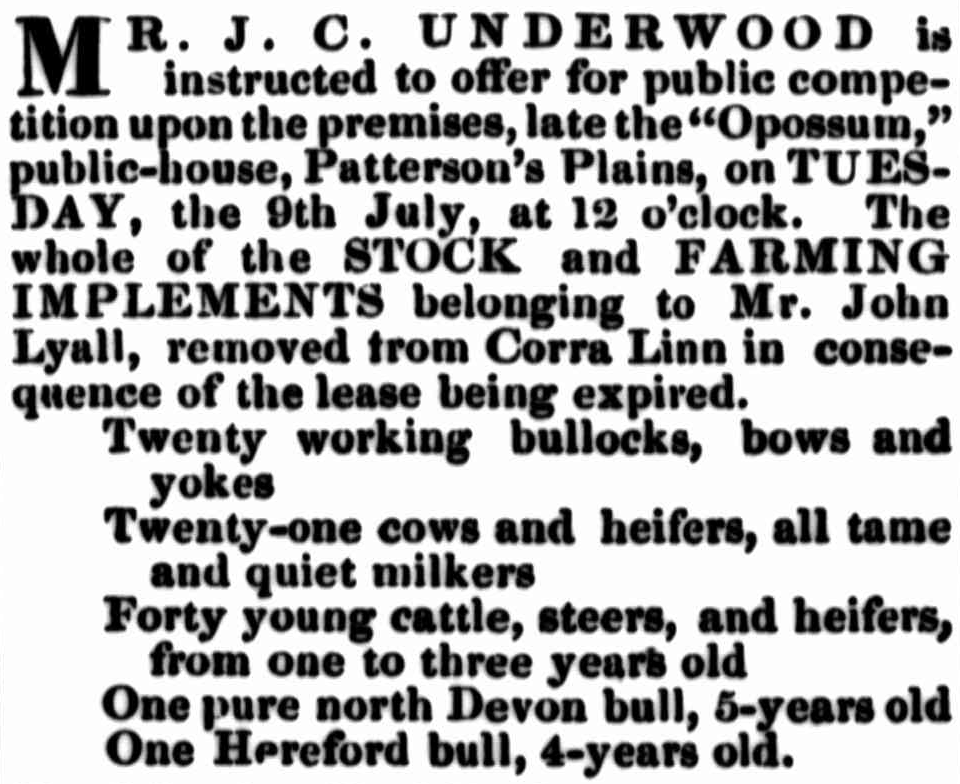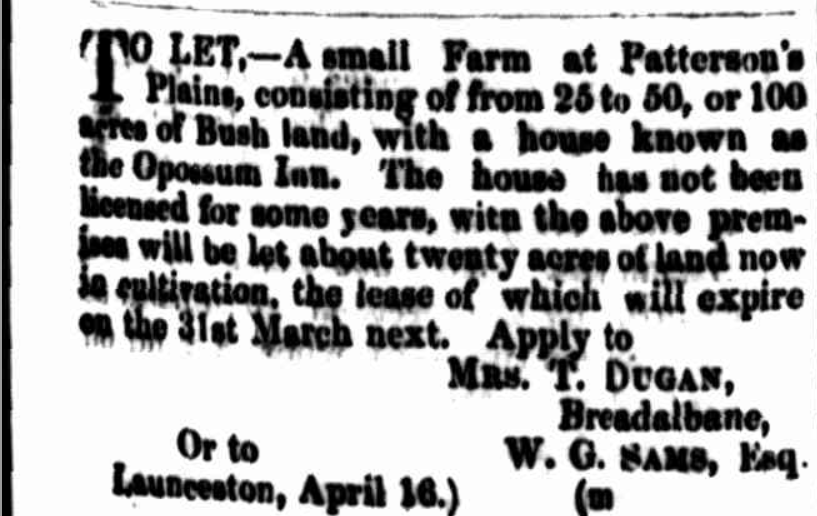1832-35- William Russell, Opossum, White Hills
1844-45 Henry Yeend, Farmer’s Arms, Patterson’s Plains
1845-1846 Matthew Mason, Farmer’s Arms, Patterson’s Plains
–> moved to Sandhill
The Opossum Inn stood on a 15 or 16 acre block by the old main road to Hobart on the western side of the Rose Rivulet valley, near that road’s junction with a local road crossing Rose Rivulet to give access to the White Hills district. There are no surface remains of the building, but in past years cultivation of the site has revealed brick fragments and bottles. The old road formation still runs south from this, past the Corra Linn (Relbia) homestead site and on towards the modern Lower White Hills Road.
“Rural Launceston Heritage Study”, Margaret Tassell, 2000 (available here)

A very warm contest next ensued, relative to the propriety of granting a license to Robert Yeend, formerly attached to the Launceston Police, for a house originally known as the “Opossum,” situate on the road to Patterson’s Plains. Almost every magistrate present concurred in giving the applicant a most undeniable character, but on the other hand several members opposed the application on the grounds of its holding out an inducement to assigned servants and others, to forget their masters business in the allurements of drinking. Mr. Mulgrave supported the petition, he considered that a well conducted house in the locality referred to, as affording the very best method of putting down the numerous sly-grog shops, with which the neighbourhood was known to swarm ; and he was quite sure that as respected runaways and other loose and dissolute charac ters, Mr. Yeend would at all times be found amongst the foremost to aid in their detection and capture. The Police Magistrate expressed an equally favorable opinion, and a show of hands being called for, it finally appeared that there were ten for and nine against the application. The house thus licensed will in future be designated the ‘ Farmer’s Arms,’ and we entertain but little doubt of its being conducted in a manner alike creditable to the landlord and beneficial to the public.
Cornwall Chronicle, 4 September 1844
TO THE EDITOR OF THE LAUNCESTON EXAMINER.
PATTERSON’S PLAINS.
SIR,-As I was much interested, in common ‘with my neighbours in the proposed licensing of the house, formerly known as the “The Opossum,” in this neighbourhood, I heartily joined in the request made, that the house should not be licensed; and I assure you, sir, the giving a license to such a house, is felt to be a serious injury to the neighbourhood.
I was much surprised, sir, to find that a magistrate should * * * * * express his conviction that the license was necessary, as he believed a great number of sly grog-shops existed in the neighbourhood !
You will, perhaps, allow me to state some facts in opposition to the assumption of the magistrate in question. In the first place, the police magistrate and other magistrates of the district were opposed to the license. In the next place, I have been resident here many years. When “The Opossum” existed, the drunkenness of my servants was intolerable. Since the house remained unlicensed, the same servants have become sober men, (so long as they remain out of town where temptation overcomes them) and so continue to the present moment–which I cannot believe they would do, if the inducements and temptations connected with sly grog-shops, existed hereabouts. At any rate, perhaps Mr. Mulgrave will explain how it is, that when we had a licensed house at hand, drunkenness prevailed; and that, with no public house, but with sly grog-shops, (Mr. Mulgrave says) temperance rules? I do not like public-houses or sly grog-shops; but, if temperance amongst my servants and sly grog-shops go together-and intemperance and licensed houses together, let me be far enough from licensed houses say I.
I do not understand the law about the limiting the number of public houses, but it is clear by your remarks, that the justices can refuse a license to premises not fit for public accommodation. And I can only tell you this, sir, that the house licensed here is not only not required by travellers, but that it is altogether in an unfit state of repair, excepting for use as a mere low road-side pot-house. * * * * *
The license was given by a majority of one!–and there can be no doubt how the casting vote of the respected chairman would have been, when he saw amongst the noes, the whole magistracy of the district, and the yeas composed of town, and remote country magistrates, who knew nothing more about the house, nor the district, than that an ex-constable, recommended by the Launceston police magistrate, wished to have a license in it. I hope you will put these few lines in your paper, and you will oblige
A PATTERSON’S PLAINS FARMER.
[As the writer has given his name, we publish his letter, striking out some objectionable passages, and an allusion, which if true, should be made the ubject of legal proceediugs.-E. L. E.]
Launceston Examiner, 11 September 1844

Transfers.–At a quarterly transfer meeting on Monday, the following were approved:-The “Ferry House,” Tamar-street, from Capt. Tulloch to Mr. J. Cordell, jun The “Farmers’
Arms,” Patterson’s Plains, from Mr. Yeend, to Mr. Mason. The ” Green Gate,” Wellington-street, from Mr. M. Mason to Mr. I. Shaw. Permission was obtained by Mrs. Sprunt to carry on the “Hadspen Inn,” recently conducted by the the late Mr. Sprunt.
Launceston Examiner, 9 August 1845
Matthew Mason, Farmer’s Arms, Patterson’s Plains.–No conviction-premises the most miserable and wretched -liquors not ” good and wholesome.”
Mr. Bartley thought the house was not required.
Mr. Atkinson had opposed the license formerly, but as it was carried, he should not now object. It would be unjust to cancel the license without some reason, but the only objection now raised, that against the premises, existed when the licence was granted.
Mr. Sinclair thought a licensed house there, prevented the establishment of sly grog shops.
Lieutenant Friend said, the police had con trout over licensed houses, but sly grog shops were dangerous, and most difficult to suppress.
Mr. Dumaresqu differed; he though there was more control over a sly grog shop than a licensed house; the latter having by their license a sanction or excuse, for all kinds of improprieties.
Major Wellman said something in favour of the license.
Mr. Bartley rose, and protested against his voting or interfering, as he was interested in the matter, having a mortgage on the property.
Major Wellman admitted the fact, but declined to receive Mr. Bartley’s advice.
Mr. Bartley said he wished to save him from the penalty of £100, for voting in a case in which lie was interested.
Mr. Sams said, it would be a great hardship to deprive the applicant of his license, for he had purchased the lease.
Mr. Bartley argued, the lease of a public house was not a vested right, and they ought not to take a man’s speculations into consideration at all. He begged to ask Mr. Sams one question; was he not executor to the owner of the property?
Mr. Sams–I am.
Mr. Bartley sat down and said no more.
Mr. Cameron thought a house necessary in that locality.
Mr. Breton and Mr. Collett suggested, that the applicant should be cautioned, to improve the premises before next licensing day. The question was put, and a majority voted for granting the application.
Major Wellman.-You see Mr. Bartley, I didn’t vote that time to accommodate you.
Launceston Examiner, 5 September 1846
